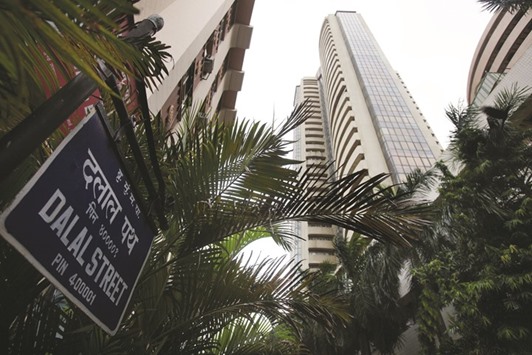Indian stocks dropped, led by lenders, in a volatile trading session that saw the benchmark index change direction at least 15 times before the central bank prepared to review interest rates.
ICICI Bank, the country’s biggest private lender, plunged the most in five months. State Bank of India, the biggest lender, dropped to its lowest level in almost two years. Maruti Suzuki India, the maker of half the cars sold in India, slid the most in a week after sales fell in January. Larsen & Toubro, the largest engineering company, climbed after saying it doesn’t expect a slowdown in orders in the year through March.
The Sensex fell 0.2% to 24,824.83 at the close in Mumbai. The gauge capped its first weekly gain in four on Friday as the Bank of Japan’s negative interest-rate strategy added to confidence that major central banks remain supportive of growth. Reserve Bank of India Governor Raghuram Rajan is expected to leave interest rates unchanged at a five-year low today after four reductions in 2015.
“At this point everybody is unclear which way the markets are going globally,” Prashasta Seth, chief executive officer at India Infoline Asset Management Co, which has $620mn in assets, said in an interview to Bloomberg TV India. “It’s very unlikely that the RBI would do anything given the choppiness all around. We expect a status quo. What we would look for is their commentary on inflation and their prognosis on the economy.”
Thirty-eight of 40 economists in a Bloomberg survey predict Rajan will leave the benchmark repurchase rate at 6.75%, while two see a cut to 6.5%.
Twenty-seven of 28 economists in a separate Bloomberg survey also predict he will keep banks’ cash reserve ratio at 4% today, compared with a call for a 50-basis point cut from Goldman Sachs Group economist Tushar Poddar. Banks in India are grappling with rising bad loans amid the highest stressed-debt ratio in at least 14 years. The central bank has set a March 2017 deadline to help bolster balance sheets by increasing provisions.
ICICI Bank tumbled 5.6%, the most since August 24, after reporting last week the slowest quarterly profit growth in six years as bad loans surged. State Bank fell 4% to its lowest level since March 2014. Axis Bank lost 2.2%.
Maruti slid 3.6%, extending this year’s loss to 15%. The stock was the best performer last year on the Sensex with a 39% rally. Its January sales fell 2.6%.
Larsen & Toubro gained 1.9%. The company said after market hours Friday it expects orders to grow 10% to 15% in the next financial year. In the September quarter, the company had scaled down its annual guidance to a 5% to 7% growth. Its third-quarter profit of Rs10.3bn matched analyst estimates.
Eight of the 15 Sensex firms that have reported December- quarter results so far have beaten or matched estimates, versus 57% in the three months ended September and 60% in June, data compiled by Bloomberg show.
SpiceJet surged 3.1% after aviation fuel prices were cut 13%. Jet Airways India gained 0.6%. InterGlobe Aviation, which runs the biggest carrier Indigo, rose 0.8%.
The Sensex fell 4.8% in January, its worst start to the year since 2011, after foreigners sold $1.8bn of local stocks last month through Thursday.
Meanwhile the rupee fell 0.1% to 67.84 a dollar, prices from local banks compiled by Bloomberg show. The yield on the sovereign notes due May 2025 rose one basis point to 7.79% in Mumbai, according to prices from the central bank’s trading system.
India’s one-year interest rate swaps held near a five-year low on speculation the central bank will take steps to tackle a cash crunch.
The cost of locking in interest rates for a year, a derivative used to guard against swings in funding costs, earlier dropped to 6.86%, the lowest since December 2010, before rising three basis points to 6.89%, according to data compiled by Bloomberg.
The contracts have fallen 18 basis points this year. The overnight call-money rate, a gauge of interbank funding availability, surged 75 basis points to 6.50%.
Capital outflows, slower government spending and central bank intervention in the foreign-exchange market have drained funds from the banking system, according to Edelweiss Financial Services.
The Reserve Bank of India won’t cut its policy rate or reduce lenders’ reserve ratios at a review on Tuesday, according to most economists surveyed by Bloomberg, although analysts expect the central bank to buy more government bonds this quarter.

The Bombay Stock Exchange building is seen in Mumbai. The Sensex closed down 0.2% to 24,824.83 points yesterday.
